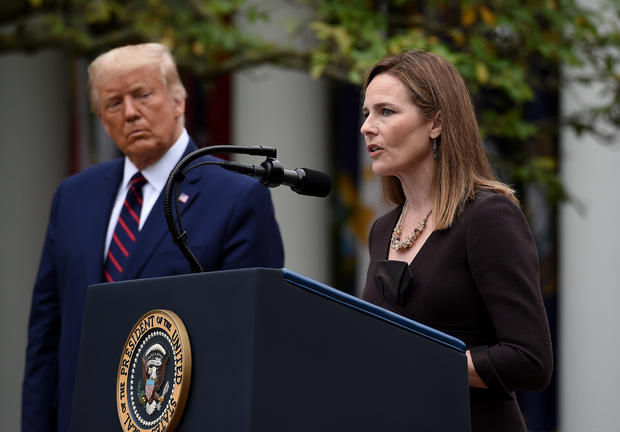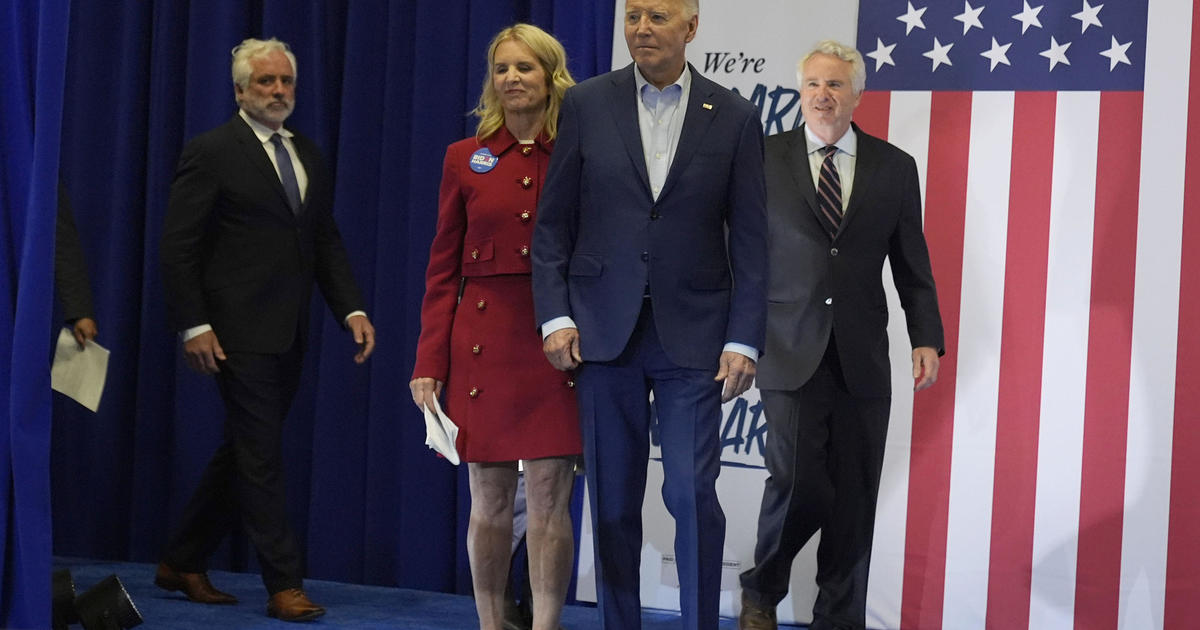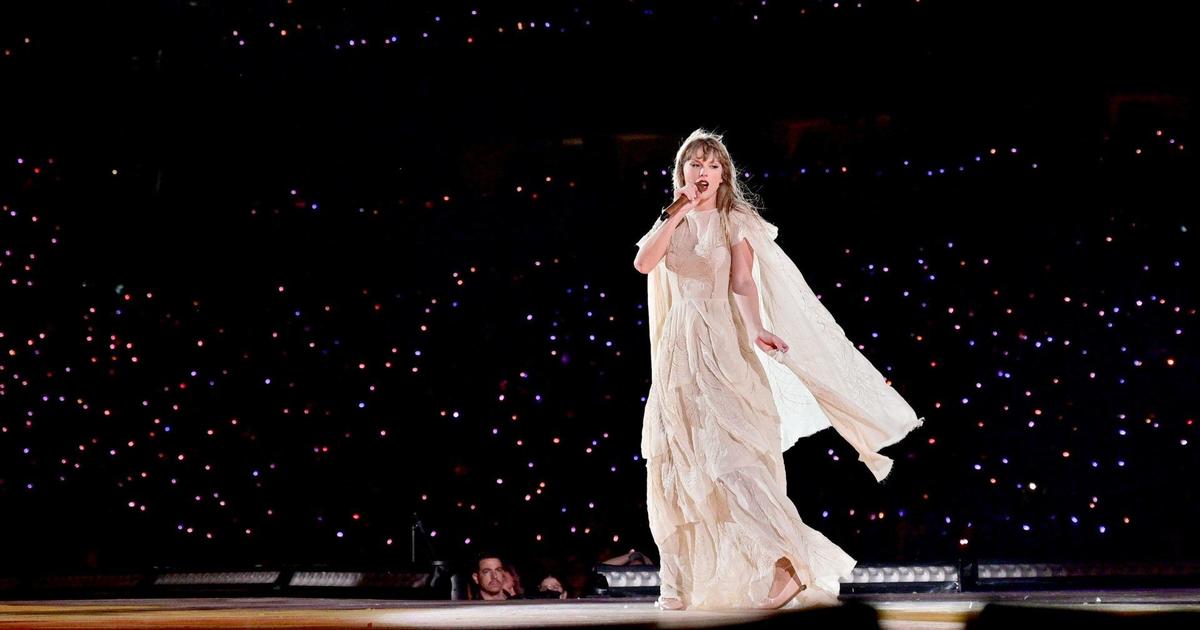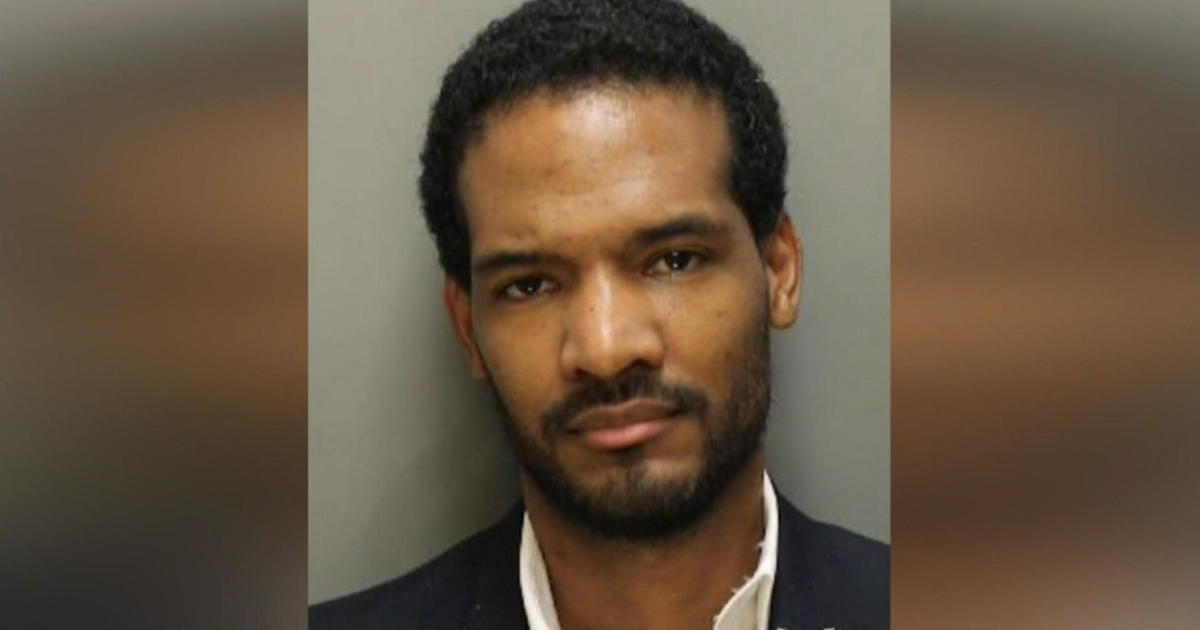Delaware Valley Elected Officials React To President Trump Naming Judge Amy Coney Barrett As Supreme Court Nominee
PHILADELPHIA (CBS/AP) -- President Donald Trump nominated Judge Amy Coney Barrett to the Supreme Court on Saturday, capping a dramatic reshaping of the federal judiciary that will resonate for a generation and that he hopes will provide a needed boost to his reelection effort. Republican senators are already lining up for a swift confirmation of Barrett ahead of the Nov. 3 election, as they aim to lock in conservative gains in the federal judiciary before a potential transition of power.
Trump, meanwhile, is hoping the nomination will serve to galvanize his supporters as he looks to fend off Democrat Joe Biden. The president hailed Barrett as "a woman of remarkable intellect and character," saying he had studied her record closely before making the pick.
"I looked and I studied, and you are very eminently qualified," he said as Barrett stood next to him in the Rose Garden.
An ideological heir to the late conservative Justice Antonin Scalia, Barrett would fill the seat vacated after the Sept. 18 death of liberal icon Ruth Bader Ginsberg, in what would be the sharpest ideological swing since Clarence Thomas replaced Justice Thurgood Marshall nearly three decades ago. She would be the sixth justice on the nine-member court to be appointed by a Republican president, and the third of Trump's first term in office.
Trump encouraged Democrats to take up her nomination swiftly and to "refrain from personal and partisan attacks."
Barrett said she was "truly humbled" by the nomination, adding that she would be "mindful of who came before me." She praised Ginsburg upon accepting the nomination, saying, "She has won the admiration of women across the country and indeed all across the world."
Within hours of Ginsburg's death, Trump made clear he would nominate a woman for the seat, and later volunteered he was considering five candidates. But Barrett was the early favorite, and the only one to meet with Trump.
Barrett has been a judge since 2017, when Trump nominated her to the Chicago-based 7th U.S. Circuit Court of Appeals. But as a longtime University of Notre Dame law professor, she had already established herself as a reliable conservative in the mold of Scalia, for whom she clerked in the late 1990s.
She would be the only justice on the current court not to have received her law degree from an Ivy League school. The eight current justices all attended either Harvard or Yale.
Trump and his political allies are itching for another fight over Barrett's faith, seeing it as a political windfall that would backfire on Democrats. Catholic voters in Pennsylvania, in particular, are viewed as a pivotal demographic in the swing state that Biden, also Catholic, is trying to recapture.
Barrett's nomination could become a reckoning over abortion, an issue that has divided many Americans so bitterly for almost half a century. The idea of overturning or gutting Roe v. Wade, the landmark 1973 decision that legalized abortion, has animated activists in both parties for decades. Now, with the seemingly decisive shift in the court's ideological makeup, Democrats hope their voters will turn out in droves because of their frustration with the Barrett pick.
Sen. Pat Toomey (R-PA) said Saturday he was "pleased" with Barrett's nomination and he will review her "record further in the coming weeks and speaking with her soon as I consider her nomination."
"Given Judge Barrett's intellect, strong legal credentials, and impeccable character, I was proud to support her confirmation to the 7th Circuit Court of Appeals in 2017. These same attributes will serve her well on the nation's highest court," Toomey said. "As a working mother with young children, Judge Barrett would also bring to the Supreme Court a background that will add to its diversity. Importantly, Judge Barrett has shown an unfailing commitment to the proper role of a judge -- which is to apply the law, including the U.S. Constitution, as written, and not to decide cases based on a preferred policy or outcome."
Toomey refused to vote on then-President Barack Obama's nominee, Merrick Garland, in 2016.
"It is common for vacancies that arise on the Supreme Court to await the outcome of the next election," Toomey said in 2016. "Given that we are already well into the presidential election process and that the Supreme Court appointment is for a lifetime, it makes sense to give the American people a more direct say in this critical decision."
While Democrats appear powerless to stop Barrett's confirmation in the GOP-controlled Senate, they are seeking to use the process to weaken Trump's reelection chances.
Biden's message to voters was "vote like your health care is on the ballot -- because it is."
"[Barrett] has a written track record of disagreeing with the U.S. Supreme Court's decision upholding the Affordable Care Act. She critiqued Chief Justice John Roberts' majority opinion upholding the law in 2012," Biden said. "The American people know the U.S. Supreme Court decisions affect their everyday lives. The United States Constitution was designed to give the voters one chance to have their voice heard on who serves on the Court. That moment is now and their voice should be heard. The Senate should not act on this vacancy until after the American people select their next president and the next Congress."
Sen. Cory Booker (D-NJ) said the Supreme Court is "facing a crisis of legitimacy, precipitated by the President's and Senate Republicans' pursuit of power at all costs."
"After spending the better part of a year refusing to even hold a hearing on President Obama's Supreme Court nominee because he was nominated in an election year, let alone vote on his confirmation, President Trump's Senate allies are rushing this nominee forward while Americans are already voting in this November's election," Booker said. "President Trump has repeatedly said he is counting on his nominee to vote in his favor in any election cases that might reach the Supreme Court later this year. That's not the way democracy is supposed to work in America."
Meanwhile, polls have shown the Democratic incumbent Booker, with a double-digit lead over his Republican challenger, Rik Mehta.
Sen. Chris Coons of (D-Del.), a member of the Senate Judiciary Committee, said "the confirmation process that is starting soon in the Senate may be the most divisive and damaging we've been through."
"With voting already underway in half the states in our presidential election and in the midst of a global pandemic that has infected 7 million Americans, we should not be proceeding with a nomination to fill Justice Ruth Bader Ginsburg's seat," Coons said. "I'm deeply concerned that my Republican colleagues' decision to move forward, against the precedent that they set in 2016, will do lasting damage to the Supreme Court, the Senate, and our country as a whole."
(© Copyright 2020 CBS Broadcasting Inc. All Rights Reserved. The Associated Press contributed to this report.)




